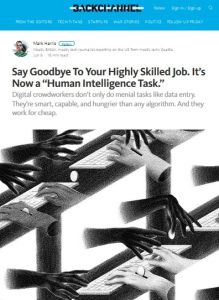Join getAbstract to access the summary!

Join getAbstract to access the summary!
Mark Harris
Say Goodbye to Your Highly Skilled Job. It’s Now a “Human Intelligence Task.”
Wired, 2016
What's inside?
Crowdworkers are feeding – and thus training – the algorithms that will, eventually, take over their jobs.
Recommendation
Crowdworking, or outsourcing tasks to an online community, continues to rise, but that may change. Science and technology writer Mark Harris investigates crowdworking, its origin and its future. He suggests that ultimately computers will remove the need for crowdworking when it comes to microtasks such as data entry. Harris concludes that, to survive, the crowdworking industry must upgrade to more interesting tasks. getAbstract recommends this article to business owners and online freelancers.
Summary
About the Author
Mark Harris is a science and technology writer for The Economist, IEEE Spectrum, The Guardian, Backchannel, MIT Tech Review, New Scientist and other outlets.
















Comment on this summary